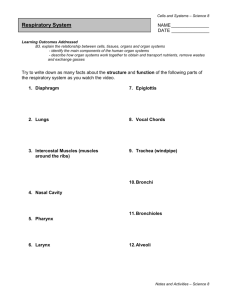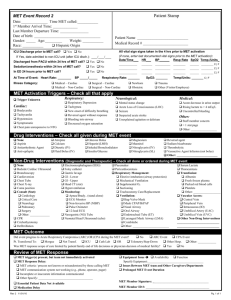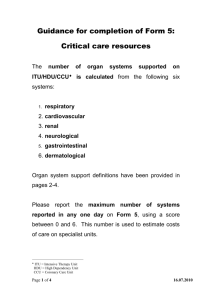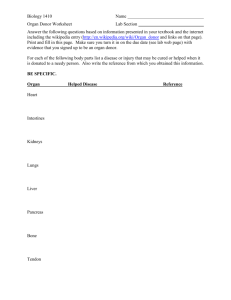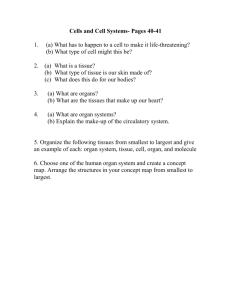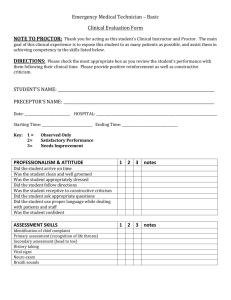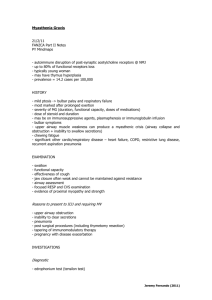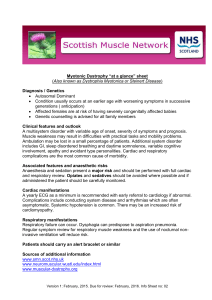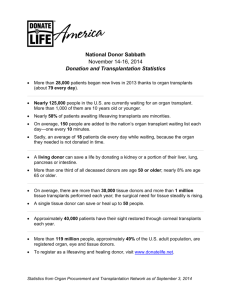Faculty OF Nursing Benha University Medical Surgical Nursing Final
advertisement
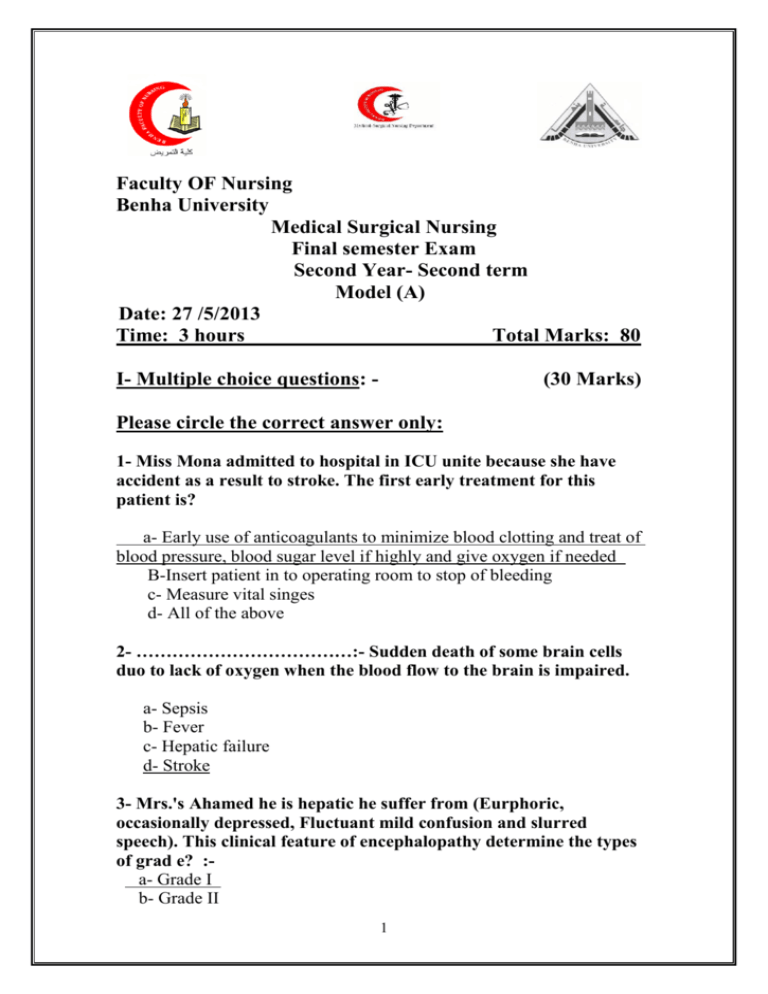
Faculty OF Nursing Benha University Medical Surgical Nursing Final semester Exam Second Year- Second term Model (A) هيئةالتهي التد Date: 27 /5/2013 هيئةالتدرر Time: 3 hours Total Marks: 80 االلتدريس I- Multiple choice questions: - (30 Marks) Please circle the correct answer only: 1- Miss Mona admitted to hospital in ICU unite because she have accident as a result to stroke. The first early treatment for this patient is? a- Early use of anticoagulants to minimize blood clotting and treat of blood pressure, blood sugar level if highly and give oxygen if needed B-Insert patient in to operating room to stop of bleeding c- Measure vital singes d- All of the above 2- ………………………………:- Sudden death of some brain cells duo to lack of oxygen when the blood flow to the brain is impaired. a- Sepsis b- Fever c- Hepatic failure d- Stroke 3- Mrs.'s Ahamed he is hepatic he suffer from (Eurphoric, occasionally depressed, Fluctuant mild confusion and slurred speech). This clinical feature of encephalopathy determine the types of grad e? :a- Grade I b- Grade II 1 c- GradeIII d- GradeIV 4- The over all nursing care goals for patient at risk of infection? a- Maintain or restore body defense (rest, sleep) b-Prevent the spread of an infection (medical and surgical asepsis) c- Teach the patient and his family about immunization, hygiene d- A and C E- All of them 5-Hyper acute phase of hepatic failure characteristic by? a- Encephalopathy within 7days of onset of jaundice very high risk of cerebral oedema b- Jaundice to encephalopathy:8-28 days high risk of cerebral oedem c- A and B d- Non of them 6- …………………….. The donors who have declare. The majority of transplanted organs come from deceased organ donors. a- Morbidity. b- Mortality c- A cadaver transplant d- Hypotension 7- Skin grafting is often used to treat:a- Burns b- Extensive wounding c- hypothermia d- A and B 8- Drugs that prevent clotting may be given for strok patient :a- Asprin b- Intravenous heparin c- oral warfain d- B and C 2 9-The O level from the critical care modernization is defined as:A- Advanced respiratory support b- High level of care C- Normal acute word care d- Acute ward care 10- PTCA is:a- A defibrillator b- Apermenant pacemaker c- Angioplasty in the coronary arteries to permit more blood flow into the heart d- None of above 11- Stents are: a- Ultrasound for detecting cardiac abnormalities b- Asmall,expanable wire tube inserted into the artery during angioplasty c- A bypass cardiac surgery d- None of above 12-Cathetar ablation uses:a- Waves or freezing to faster abnormal area in the heart b- Waves to decrease abnormal area in the liver C- Radio waves or freezing to silence an abnormal area in the Heart's electrical system d- All of the above 13-Internal cardioverter defibrillator is: a- A permanent pacemaker b- A defibrillator device that inserted into patient heart to sent small amount of electricity c- A balloon tipped catheter d- None of above 14- Atherectomy is: a-A small balloon is inflated inside the blocked artery b- The blocked area is "shaved" away by a tiny device c- A laser used to vaporized the blocked area d-None of above 3 15 - Drug-eluting stents are coated with a- Tissues b- Medications c-Cells d-None of above 16- Clopidogrel(plavix) is: a-Antibiotic b-Antiarrhythmic c-Antihypertensive d-Antiplatelet 17- A commissurotomy is a method of repairing? a- Liver b-Kidney c-Muscles d-A stenotic valve 18- Annuloplasty is a method of repairing? a- A stenotic valve b- A regurgitating valve c- stenotic and regurgitating valve d-None of above 19- The nurse understands that in the absence of pathology, a client respiratory center is stimulated by? a) Oxygen b) Lactic acid c) Calcium ions d) Carbon dioxide 20- under production of thyroxin produces? a) Mxyedema b) Acromegaly c) Graves diseases d)Cushing syndrome 4 21-As a result of low levels of t3 and t 4 the nurse should expect a client to exhibit? a) Irritability b) Tachycardia c) Cold intolerance D) Profuse diaphoresis 22- When teaching a client with hyperthyroidism about diagnostic tests to be done. The nurse should include: a) T 4 and x- ray film b) TSH assy and t3 c) thyroglobin levels and po2 d) Protein –bound iodine and SMA 23- Common cause of Respiratory acidosis a- Respiratory depression ,Pulmonary disease, respiratory under ventilation) b- Hyperventilation (emotions, pain, respirator over ventilation) c- A and B d- no one from above 24- Common cause of metabolic acidosis a- Diabetes, shock, renal failure, intestinal fistula b- Sodium bicarbonate overdose, prolonged vomiting, nasogastric drainage c- Gastritis d- no one from above 25- Hyperthermia during unconsciousness related to abcd- infectious process; damage to hypothalamic center infectious process damage to hypothalamic center Immobility 26- MR Ahmed height is 180cm and his wt is 81kgcalculte the Basal metabolic rate a- 80 cal per hour 5 b- 80 cal per day c- 160 cal per day d- 1920 cal per day 27- Tetany results from a- over-excitability of the central and peripheral nervous systems due to alkalosis b- over-excitability of the central and peripheral nervous systems due to Acidosis c- paralysis d- fluid imbalance 28- Regulation of fluids and electrolytes include:a- Antidiuretic hormone and Aldosterone b- Conteols Na+ absorption and K+ loss along the DCT c- Natriuretic peptides (ANP and BNP) d- All of the above 29- There are several types of PTCA procedures, including: a- Balloon angioplasty B-Atherectomy C-Laser angioplasty D-ALL of above 30- Indication for CABG are: A-Chronic and infarction angina B-Angina unresponsive to medical therapy C-Triple vessel diseases D-All of above 6 II- Put circle around (T) if the statement is true and (F) if statement is false: (10 Marks) 1- Wilson's disease is the causes of hepatic failure. T 2- Age below 18 years and diabetes type 2 is absolute contraindication of organ transplantation. T 3- Valves that do not close properly allow blood leakage, regurgitation during cardiac cycle. T F F 4- Aspirin and non-steroidal anti-inflammatory products must be continued at least 7 to 10 days prior to cardiac surgery. T F 5-Hypoxemic respiratory failure means an abnormally low pressure of carbon dioxide in the blood. T. F. 6- Narcotics may lead to impaired drive which cause hypoxemic respiratory failure T. 7- Cretinism means thyroid deficiency at birth T. F. F. 8- Multiple organ dysfunction syndrome is one the complications of SIRS T. . F 9-The major effect of acidosis is disorientation due to the depression of the central nervous system T. F. 10-Assess cognitive function by evaluate Orientation by Person, place, and time and local current events 1 2 3 4 5 6 t 7 T. 7 8 F. 9 10 III- Matching : ) 15 Marks) Column A 1 Infection Column B a Blood clot can from in a chamber of the heart when the heart beat irregularly 2 Grade III of encephalopathy 3 Embolic Stroke b Sleep most of the time ,unable to converse irritability with violence c Performed on patients with end stage heart disease 4 Rehaplitation d Mean the successful invasion , establishment and growth of microorganism 5 Heart transplantation e Comperhansive program designed to regain function as much as possible *** Read carefully the above questions and put the correct answer in suitable place 1 D 2 B Column A 1 Critical care nursing 2 Critical care 3 a 4 E Column B 5 C a Patients who are requiring complex care b Specialty within nursing that deals specifically with human response to lifethreatening problems 3 Emphysema c The care of seriously ill patients from point of injury or illness until discharge from intensive care 4 Critically ill patients d Elevated carbon dioxide pressure in the blood 8 5 Hypercapnic e It is enlargement of the air spaces due to dilatation and /or destruction of the alveolar walls. *** Read carefully the above questions and put the correct answer in suitable place 1 B 2 C 3 E 4 A Column A 1 in hyponatremia 2 manifestations of hyperkalemia 5 D Column B cardiac conducting system and include A dysrhythmias, and cardiac arrest may develop seizures, aspiration, hypoxia, B and shock. 3 From Decrease the level from2+ < 1.7mg/L Hypocalcemia C manifestation 4 Hypomagnesemia. 5 acidosis D numbness-tingling of fingers and lips, muscle cramps, tetany, convulsions E arterial pH < 7.35 *** Read carefully the above questions and put the correct answer in suitable place 1 B 2 A 3 D 4 C V- Complete 5 E Score: 10 Mark Problems with mechanical ventilation 9 1- ventilator problems increase inpeak airway pressure due to coughing, plugged airway tube solution suction decrease in pressure or loss of volume due to pneumothorax, atelectasis, or bronchospasm solution suction and correct leak 2- patient problems Cardiovascular compromise due to decrease intravenous return. Solution; assess for adequate volume status Pulmonary infection due to impaired cough reflex Solution; provide mouth care, optimize nutritional status 2- Complication of liver transplantation Immediately post operative complication: - Bleeding -infection - Rejection -obstruction biliary anstomosis Potential complication: - Vascular thrombosis - Stenosis 3- Factores increase chance for a successful organ transplant: The age of the donor organ. Generally, the younger the organ donor, the healthier the tissue. 11 The length of time that the donor organ is out of the donor's body. The more quickly an organ is transplanted once it is removed from the donor, the more viable the organ tissue remains. How well the organ was preserved just before transplantation. The donor organ must be properly preserved while it is being transferred. General health. If you have a chronic condition such as hepatitis C that will damage the donor organ once it is transplanted, the likelihood for a long-lasting organ transplant is limited. IV. Situation 15Mark Mr. Nagib has admitted to hospital emergency department after care accident, by assessment: found that no eye opening on stimulation, absence of comprehensible speech, and failure to obey commands. Abnormal flexor posturing means Please Read situation carefully then answer the following question 1- What the tool used to rapid assessment of this patient? (1m) 2- By using GCS 3- Enumerate the factors that may be cause this state?(4m) 1. trauma, 11 2. vascular disorders, 3. neoplasms, degenerative, 4. infectious disorders 5. variety of metabolic disorders 6. structural neurologic lesions. 4- List thee nursing diagnosis? Conceder the priority (4m) Decreased Intracranial Adaptive Capacity Ineffective Airway Clearance related to upper airway obstruction by tongue and soft tissues; inability to clear respiratory secretions Risk for Imbalanced Fluid Volume related to inability to ingest fluids, dehydration from osmotic therapy (when used to reduce intracranial pressure) 5- Discuss the nursing care of previous nursing diagnosis?(6m) Minimizing Secondary Brain Injury Monitor for change in neurologic status, decreased LOC, onset of cranial nerve deficits. 12 Identify emerging trends in neurologic function, and communicate findings to medical staff. Monitor response to pharmacologic therapy including drug levels, as indicated. Monitor laboratory data, CSF cultures, and Gram's stain, if applicable, and communicate findings to medical staff. Assess neurologic drains/dressings for patency, security, and characteristics for drainage. Institute measures to minimize risk for increased intracranial pressure (ICP), cerebral edema, seizures, or neurovascular compromise. Adjust care to reduce risk of increasing intracranial pressure (ICP): body positioning in a neutral position (head aligned with shoulders) without flexing head, reduce hip flexion, distribute care throughout 24-hour period sufficiently for ICP to return to baseline. Monitor temperature status. Maintain normothermia. Maintaining an Effective Airway Position patient to prevent tongue from obstructing the airway, encourage drainage of respiratory secretions, and promote adequate exchange of oxygen and carbon dioxide. Keep the airway free from secretions with suctioning. In the absence of cough and swallowing reflexes, secretions rapidly accumulate in the posterior pharynx and upper trachea and can lead to respiratory complications (eg, aspiration). o Insert oral airway if tongue is paralyzed or is obstructing the 13 airway. An obstructed airway increases ICP. This is considered a short-term measure. o Prepare for insertion of cuffed endotracheal tube to protect the airway from aspiration and to allow efficient removal of tracheobronchial secretions. o enated blood to the CNS. o Pretreat before suctioning with sedative, opioid, or endotracheal lidocaine, if indicated. Attaining and Maintaining Fluid and Electrolyte Balance Monitor prescribed I.V. fluids carefully, maintaining euvolemia, minimizing large volumes of “free water,†which may aggravate cerebral edema. Maintain hydration and enhance nutritional status with use of enteral or parenteral fluids. Measure urine output and specific gravity. Evaluate pulses (radial, carotid, apical, and pedal); measure BP; these parameters are a measure of circulatory adequacy/inadequacy. Maintain circulation; support the BP and treat lifethreatening cardiac dysrhythmias. Staff member of medical surgical nursing (2013) Abeer Yahia Amel Said Sabah Said Samah Essaid Safaa Mohamed 14 15
